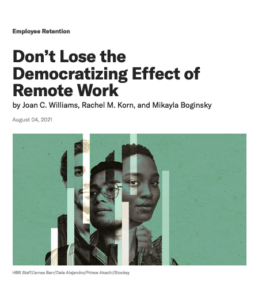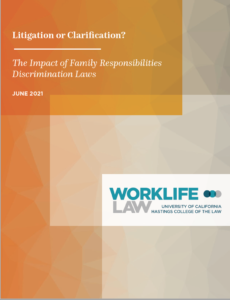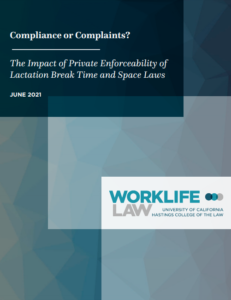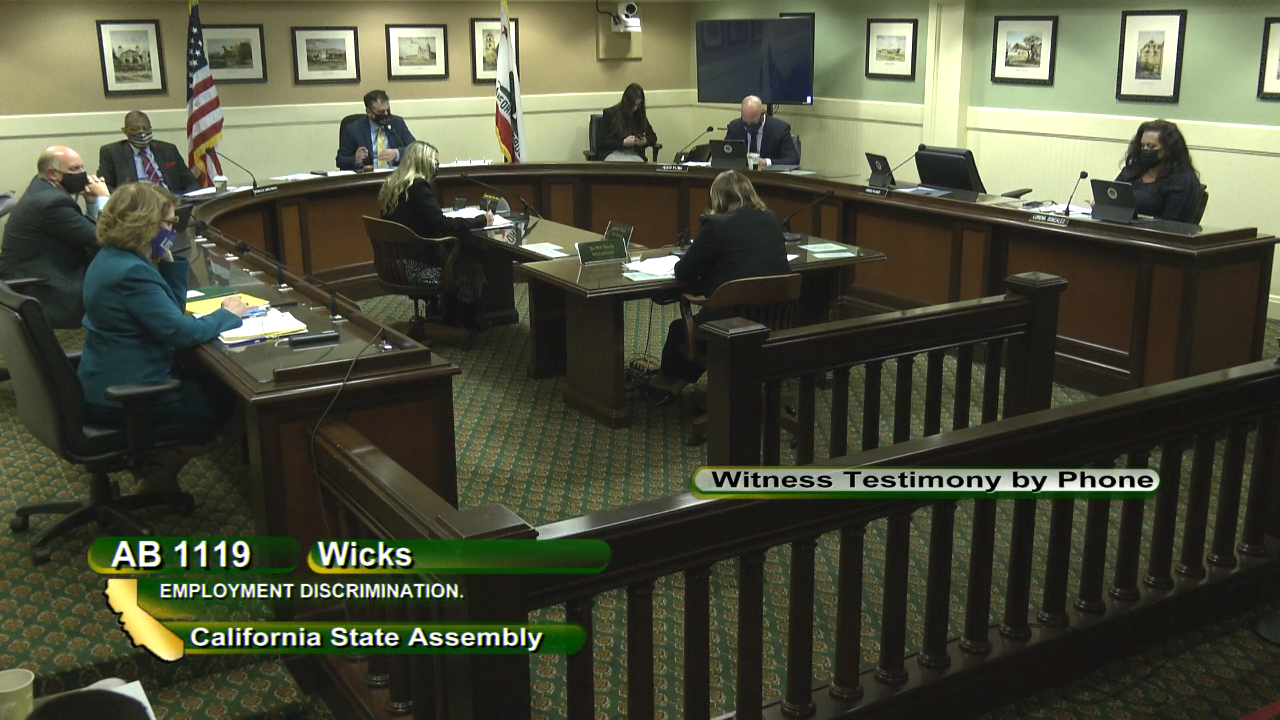WorkLife Law’s Summer Research Assistant
 This summer, UC Berkeley student Kybeth Ruiz-Gaytan joined the Center for WorkLife Law team as a research assistant. Kybeth investigated current employer policies and employee needs, which culminated in the creation of our new Toolkit for Centering Equity in the Transition to Hybrid Work. She also added to the Center’s research database by conducting literature reviews focused on how bias plays out for individuals in the LGBTQIA+ community and people with disabilities.
This summer, UC Berkeley student Kybeth Ruiz-Gaytan joined the Center for WorkLife Law team as a research assistant. Kybeth investigated current employer policies and employee needs, which culminated in the creation of our new Toolkit for Centering Equity in the Transition to Hybrid Work. She also added to the Center’s research database by conducting literature reviews focused on how bias plays out for individuals in the LGBTQIA+ community and people with disabilities.
WorkLife Law’s Mark Hart Fellow
 This summer, Loyola Marymount University student Kylie Francisco joined the Center for WorkLife Law team as our Mark Hart Fellow. Working with, Director Joan C. Williams, Kylie investigated the impact of race and social class in recent presidential elections, with a particular focus on comparing the voting patterns of college-educated and non college-educated voters. Her analysis of polling data and qualitative studies over the last three months provide enormous insight on why class matters in today’s political climate. This opportunity would not have been possible without the generous contribution of the Mark Hart Fellowship.
This summer, Loyola Marymount University student Kylie Francisco joined the Center for WorkLife Law team as our Mark Hart Fellow. Working with, Director Joan C. Williams, Kylie investigated the impact of race and social class in recent presidential elections, with a particular focus on comparing the voting patterns of college-educated and non college-educated voters. Her analysis of polling data and qualitative studies over the last three months provide enormous insight on why class matters in today’s political climate. This opportunity would not have been possible without the generous contribution of the Mark Hart Fellowship.
WorkLife Law’s Ruth Bader Ginsburg Fellow
 This summer, University of Pittsburgh student Olivia Andrews worked as Center for WorkLife Law’s Ruth Bader Ginsburg Fellow. Olivia examined gender bias in the field of cardiology and analyzed the patterns of discrimination that pregnant cardiologists face in the workplace. She also investigated the role that gender, race, and class discrimination play in the finance sector in order to explain the lack of diversity within the industry. Olivia’s work has been made possible thanks to the distinguished Ruth Bader Ginsburg Fellowship.
This summer, University of Pittsburgh student Olivia Andrews worked as Center for WorkLife Law’s Ruth Bader Ginsburg Fellow. Olivia examined gender bias in the field of cardiology and analyzed the patterns of discrimination that pregnant cardiologists face in the workplace. She also investigated the role that gender, race, and class discrimination play in the finance sector in order to explain the lack of diversity within the industry. Olivia’s work has been made possible thanks to the distinguished Ruth Bader Ginsburg Fellowship.
New Toolkit for Centering Equity in the Transition to Hybrid Work
 Mishandling the transition to hybrid work threatens to reinforce social inequalities and jeopardize companies’ diversity, equity, and inclusion (DEI) efforts. Read more in our latest Harvard Business Review article, “Don’t Lose the Democratizing Effect of Hybrid Work” and check out our new toolkit with A Better Life Lab for concrete guidance on how to ensure an equitable transition to hybrid work.
Mishandling the transition to hybrid work threatens to reinforce social inequalities and jeopardize companies’ diversity, equity, and inclusion (DEI) efforts. Read more in our latest Harvard Business Review article, “Don’t Lose the Democratizing Effect of Hybrid Work” and check out our new toolkit with A Better Life Lab for concrete guidance on how to ensure an equitable transition to hybrid work.
New report- “Litigation or Clarification? The Impact of Family Responsibilities Discrimination Laws”
 Our newest report, “Litigation or Clarification? The Impact of Family Responsibilities Discrimination Laws” explores whether and to what extent family responsibilities discrimination laws increase litigation against employers. Our research shows that the passage of such laws does not meaningfully increase litigation rates.
Our newest report, “Litigation or Clarification? The Impact of Family Responsibilities Discrimination Laws” explores whether and to what extent family responsibilities discrimination laws increase litigation against employers. Our research shows that the passage of such laws does not meaningfully increase litigation rates.
New Report: Compliance or Complaints? The Impact of Private Enforceability of Lactation Break Time and Space Laws
 Our latest report, “Compliance or Complaints? The Impact of Private Enforceability of Lactation Break Time and Space Laws” investigates whether the federal PUMP for Nursing Mothers Act, if passed, would lead to a landslide of litigation against employers. Our new research shows it would not.
Our latest report, “Compliance or Complaints? The Impact of Private Enforceability of Lactation Break Time and Space Laws” investigates whether the federal PUMP for Nursing Mothers Act, if passed, would lead to a landslide of litigation against employers. Our new research shows it would not.
Our Latest Op-Ed: California Should Protect the Work Rights of Family Caregivers

Read our latest op-ed in the Los Angeles Times on why California Assembly Bill AB1119 is imperative for workers with family responsibilities.
Ready to make real progress on diversity? Watch our Director’s latest TED Talk

In her TED talk Why Corporate Diversity Programs Fail & How Small Tweaks Can Have a Big Impact, the Center for WorkLife Law’s Founding Director Joan C. Williams explains why the basic tools of the diversity-industrial complex don’t work, and provides a straightforward approach for CEOs and business leaders seeking to address structural racism within their organizations.
Watch our Deputy Director’s Testimony in Support of AB 1119 to Prevent Family Responsibilities Discrimination in California

The Center’s Deputy Director, Liz Morris, testified before the California State Assembly’s Labor and Employment Committee in support of the Bill AB 1119, which would make it illegal for California employers to discriminate against workers with family responsibilities.
Hearing on the PUMP for Nursing Mothers Act

The Center for WorkLife Law provides testimony in support of the PUMP for Nursing Mothers Act to the House of Representatives Committee on Education and Labor.